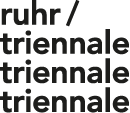Surrogate Cities Ruhr
Choreography for the Ruhrgebiet by Mathilde Monnier with music by Heiner Goebbels
- (c) Wonge Bergmann
- (c) Wonge Bergmann
- (c) Wonge Bergmann
- (c) Wonge Bergmann
- (c) Wonge Bergmann
Composition —
Musical Direction —
Choreography —
Stage —
Light —
Sounddesign —
Collaboration Choreography —
Lluis Ayet, Jorge Gonçalves, Thibaut Kaiser
Song —
Voice —
With —
130 Akteuren aus der Metropole Ruhr
Texts by —
Paul Auster, Heiner Müller, Hugo Hamilton
Shows
Tickets
— 20 / 30 / 40 / 55 €Reduced prices start at 10,00 €
Discount for young people
Children and young people up to the age of 27 can book special discounted 10 € tickets in all available price categories. The discount is available online here.
Project supporter
With the friendly support by Institut français and the association of friends and supporters of Ruhrtriennale e.V.
September
-
Sat20Sep
19.30Surrogate Cities Ruhr on 20. September 2014 at 7.30 PM -
Sun21Sep
16.00Surrogate Cities Ruhr on 21. September 2014 at 4.00 PM -
Fri26Sep
19.30Surrogate Cities Ruhr on 26. September 2014 at 7.30 PM -
Sat27Sep
19.30Surrogate Cities Ruhr on 27. September 2014 at 7.30 PM
Recommendations
Open discussion
— 26. September, following the show
Music theater with Ensemble Modern Orchestra, Production by Heiner Goebbels
15. August 2014, 16. August 2014, 17. August 2014, 22. August 2014, 23. August 2014, 24. August 2014
Kraftzentrale, Duisburg
A production by Ruhrtriennale.
Coproduction Zukunft@bphil - Département éducatif de l'Orchestre philharmonique de Berlin - Zukunft@bphil est soutenu par la Deutsche Bank, Centre chorégraphique national de Montpellier Languedoc-Roussillon - programme Hors Séries
Coproduction Zukunft@bphil - Département éducatif de l'Orchestre philharmonique de Berlin - Zukunft@bphil est soutenu par la Deutsche Bank, Centre chorégraphique national de Montpellier Languedoc-Roussillon - programme Hors Séries






Press Comments